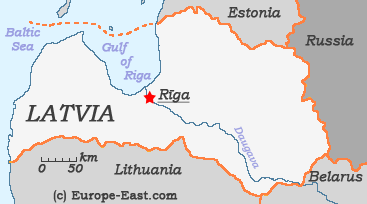Official name
Latvijas Republika (Republic of Latvia), shortly Latvija (Latvia). A tribe of the same name, which settled in the area some 2,000 years ago, is the origin for the recent name. However, the origin of the tribe's name is not clear. Actually there were four tribes and therefore four different historical provinces - Latgallians (Latgale), Livonians (Vidzeme), Couronians (Kurzeme) and Semigallians (Zemgale). Obviously, the country's name derives from the Latgallians (Latgale).
From 1940 to 1941 and from 1944 to 1991, Latvia was one of the 15 Soviet republics and therefore known as Латвийская ССР (Socialist Soviet Republic Latvia).
Area & Population

| ||
| Clickable map of Latvia |
64'589 km², making it slightly bigger then West Virginia.
Latvia has a population of around 2.31 million * (2004) - the country is rather sparsely populated. Additionally, the population growth rate is negative (estimated -0.71% for 2004).
Of the Latvian population, 57.7% are Latvians, 29.6% Russians, 4.1% Belarusians, 2.7% Ukrainians, 2.5% Polish and Lithuanian, Jewish, German and other minorities. There are also some very minor groups such as the Couronians (some 1,500 people), Livonians etc. The Russian community is particularly strong in a few parts of the country (for example in the capital) whereas in other parts there are only very few Russians.
Religion
For historical reasons, the majority of believers belongs to the Roman-Catholic faith. Furthermore, there are Protestants, Orthodox, Babtists and Jewish minorities.
Time zone
Eastern European time: UTC +02 hrs, with daylight-saving time (+1 hour) in summer.
Latvian. This language - as many other languages - was widely oppressed in the Soviet Union and almost faced extinction. Latvian belongs to the Baltic language group, which again is part of the large Indo-European language family, as do →Lithuanian and the already extinct Prussian and Livonian language.
Because of the country's history, Latvian features numerous loan words from German, Swedish, Russian and more. The national anthem for example is titled Dievs, svēti Latviju - [dievs] most likely derives from the Latin word [deus] (god) and [svēti] from the Slavic word for "holy" or "bless" respectively.
Latvian doesn't use articles but there are male and female nouns, characterized by their ending: Masculine nouns often have the ending -s (e.g. Augusts = August), feminine nouns often end on -a (duša = shower). The same is applied to foreign words and even foreign names. Apart from that, Latvian has six cases (same as Russian), making it a bit tough to learn for English speakers but comparetively easy for Russian or also German speakers.
The latin alphabet is used, but there are a few diacritic symbols to bridge the gap between written and spoken language. There are vowels with a horizontal stroke above them (macron, marking long vowels), some consonants with a comma on the top or below (cedilla, palatized) and consonants with a caron for sibilant consonants. Since these diacritic symbols are essential for Latvian, here a short overview:
- Ā (ā) : Stretched [A] as the [ar] in [bark]
- Ē (ē) Stretched [E], in English as a long [a]
- Ī (ī) Stretched [i] as the [ee] in [deep].
- O (o) (without a macron). More a diphthong, close to the [a] in [water]. Sometimes also spelled [uo] .
- Ū (ū) Long [o] as in [code].
- Č (č) As the [tch] in [catch].
- Š (š) As the [sh] in [rush].
- Ž (ž) As the [g] in [gin].
- Ģ (ģ) Soft D (dy) - close to the [j] in [jam], but the exact sound doesn't exist in English.
- Ķ (ķ) Soft T (ty), close to the ch in [charly].
- Ņ (ņ) Soft n (ny) - close to the [ñ] in [cañon].
- Ļ (ļ) Soft l (ly) - close the [li] in [million] but somehow different.
To make things worse, the pronunciation of some letters differs according to the position within the word and the preceding letter. Good news is that it's almost always the first syllable that is been stressed. Sounds complicated? No problem! At least in the capital, virtually everything is trilingual: Latvian, Russian and English. Many (if not the majority in the capital) speak Russian and / or rather good English.
©2024 Europe-East.com

 Albania
Albania Latvia
Latvia